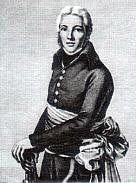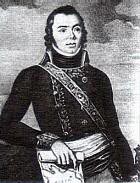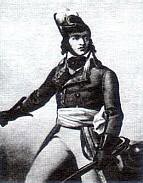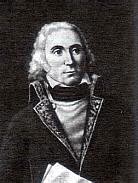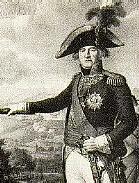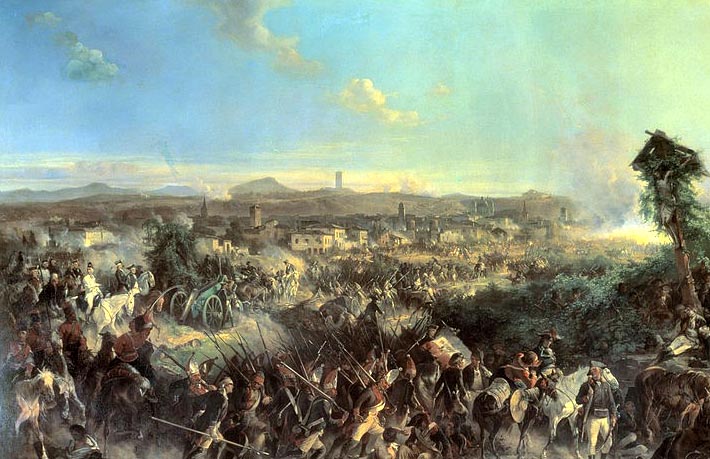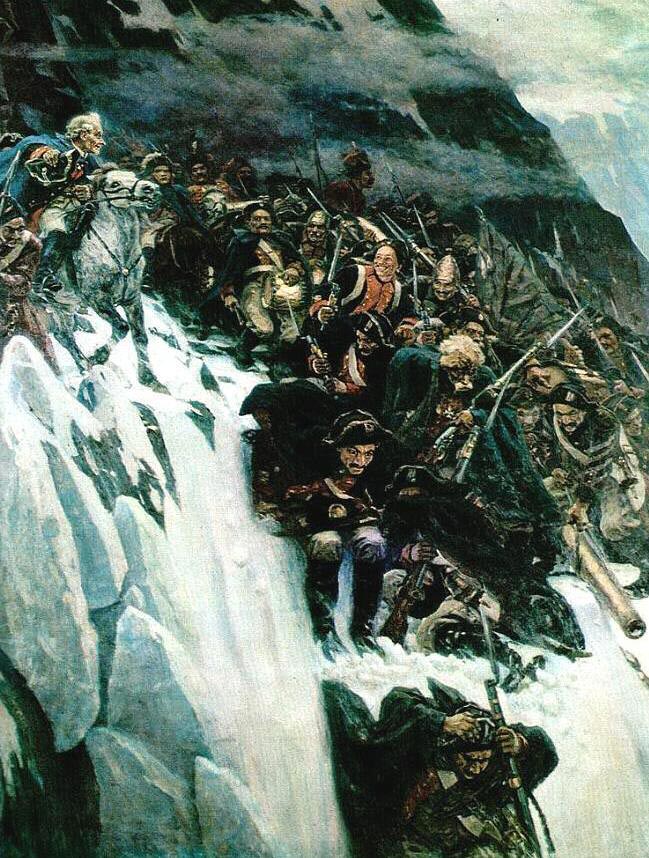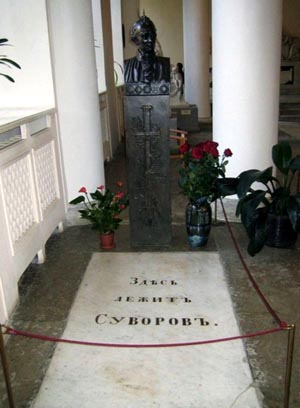Suvorov
| "Science Of Victory" And Disfavour |
|
|
In 1795-1796 General-Field Marshal Suvorov commanded troops in Ukraine, his head-quarters was in Tulchin town.
There he was occupied much with troops training and wrote the main part his famous book "Science of Victory". In this book he in his own very vivid and laconic manner stated on paper his conception of military actions.
After the death of Catherine II in 1796, Paul (Pavel) I became the Russian Emperor. From the first days of his reign he began to reform the Russian army on Prussian model.
Suvorov protested against Prussian order in Russian army and because of this the Emperor and his court began to treat him hostilely very soon. And on February,8, 1797 the famous general was dismissed and exiled to his estate in Konchanskoe village.
This exile lasted about two years and during all this time the Field Marshal was under surveillance of the local police.
| The First Russian-French War. Campaigns in Italy and Switzerland. Generalissimo. |
In 1798 the Russian Empire joined the Second anti-French coalition (Great Britain, Austria, Naples). At the urgent request of the allies and especially of the Austian Emperor Paul I had to appoint Suvorov the Commander-in-Chief of the allied forces of Russia and Austria in Northern Italy. Before his leaving Suvorov was rewarded with the Order of Saint John's Big Cross (a Maltian Order). When Suvorov passed through Mitava town he was presented to exiled French King Louis XVIII.
Under Suvorov's plan the Allied forced were to crush the French republician armies of Generals Scherer and Macdonald one by one, occupy Northern Italy and then to begin the powerful offensive to Paris. Suvorov arrived to the army in Italy on April, 4, 1799 and on April 8 he took offensive and defeated French troops of Generals Scherer, Moreau and Seruier (General Serurier was captured by Austrians on April,17) in several actions in the region of the river Adda.
| French Generals that took part in the Italian and Swiss campaigns of 1799 | ||||
|
|
|
|
|
|
After a swift march Suvorov's troops occupied Milan on April,18 and on May,15 Russian and Austrian troops occupied Turin. Then Suvorov turned against General Macdonald troops (30 thousands) coming to the aid to General Moreau.
On June,1 General Macdonald smashed General Hohenzollern's detachment and on June,6 attacked the troops of General Ott 5 thousand in number. Suvorov rose a general alarm and put in motion his army worn out by terribly hard marches. He made his soldiers to run and about 4 p.m. joined battle. Macdonald retreated to the river Trebbia hoping to give a new battle next day in the morning. But Suvorov was first to attack and in spite of superior numbers of French troos he defeated Macdonald on June 7-8 and forced him to retreat. On July,17 the strong fortress of Mantua capitulated.
On July,24 young and talented French General Joubert came to Italy and took command of French forces replacing General Moreau. On August,3 French troops came to the town of Novi and took advantage-ground in front of the Russian-Austrian army. On August, 4 Suvorov began attacking. In the very beginning of the battle General Joubert was killed, before his death he gave his last oreder - to attack. Suvorov waited just this. But General Moreau that took the command preferred to keep to defences.
|
|
Hour after hour under terribly strong enemy fire Russians had been breaking the fotified enemy positions methodically.
At last after 16 hours of fierce fighting this one of the bloodiest battles of the end of XVIII century was finished. The French forces were defeated.
Then in a very short time French were dislodged from whole Northern Italy, the territories Austria pretended to.
For this campaign Paul I gave Suvorov the title of "Knyaz Italiysky" (Prince of Italy).
In the middle of August, 1799 Suvorov was informed about the plan of Paul I and Austrian Emperor Francis I to continue the war in Switzerland. On August,28 Suvorov with his troops left Italy hoping to cross the Alps and get Switzerland by the shortest way. There he planned to join the Corps of Generals Rimsky-Korsakov and von Gotze.
This march across the Alps was extremely hard. Not having enough food, ammunition and exact maps the Russian army could reach the Saint Gottard pass and took it by storm on September,13, and the same day Russian troops hurled back the French from their fortified positions near Ober-Alp.
|
|
The next day French General Lecourbe that had been defeated at Saint Gottard stopped the Russian army's way again in a mountain passage not far from "the Devil's Bridge". On September,14 Generals Miloradovich and Bagration's detachments fought their way through the passage and after the very fierce and bloody battle took "the Devil's Bridge".
|
|
At this time (September, 14 - 15, 1799) in Switzerland french Commander-in-Chief General Massena crushed the Russian Corps of General Rimsky-Korsakov, and General Soult smashed von Gotze's Corps. It seemed in this situation Suvorov was doomed to inevitable defeat. But he did not know about these events then and completed crossing the Alps, reached Altdorf and only here he got to know about defeat of the Russian troops in Switzerland.
Suvorov gathered his officers and on the council of war they decided to fight their way out of encirclement. During September, 18, 19 and 20 General Rosenberg's rear-guard fought against superior forces of General Massena. Rosenberg could defeat about 15 thousand republician soldiers and gave Suvorov an opportunity to escape the utter defeat.
The worn out rear-guard of General Bagration reached Glarus and could repulse a French detachment of 5 thousand only by bayonet attacks, when General Miloradovich's vanguard was acsending to the mountain.
At last after another two bloody battles Suvorov with his troos joined the rest of Rimsky-Korsakov's Corps.
On October, 28 Suvorov received Emperor Paul's order to return to Russia. It was the end of this campaign. Though Suvorov gained many victories in this campaign and the march across th Alps was a great thing, the whole campaign was lost.
For the Italian and Swiss campaigns Suvorov was promoted to the highest military rank of generalissimo. And this time Suvorov was a bearer of all Russian military Orders and also had the rank of Austrian field marshal.
But after these campaigns Suvorov fell into disfavour again. At first on his way to St.Petersburg he got Emperor Paul's reprimand for during this campaign he did not have a special general of the day in his staff as it was ordered in the regulations.
Then when serioulsy ill Suvorov came to St.Petersburg he was said Emperor Paul I did not want to meet with him and after all Suvorov was deprived of all his aides-de-camp.
This was very hard for the old general and undermined his health very much.
As a result on May,15, 1800 at 3 p.m. Suvorov passed away.
His funeral was of a real people's nature, though the Guards did not take part in this ceremonial under pretence of weariness of the recent parade. When somebody asked would the hearse be able to pass through the narrow gate of the Alexandro-Nevskaya Lavra (monastery of the first rank), one of old Suvorov's grenadiers answered :
Our Suvorov has always passed everywhere !
On Suvorov's grave in the Alexandro-Nevskaya Laura there is a plane tombstone with a short inscription:
SUVOROV LIES HERE
|
|


